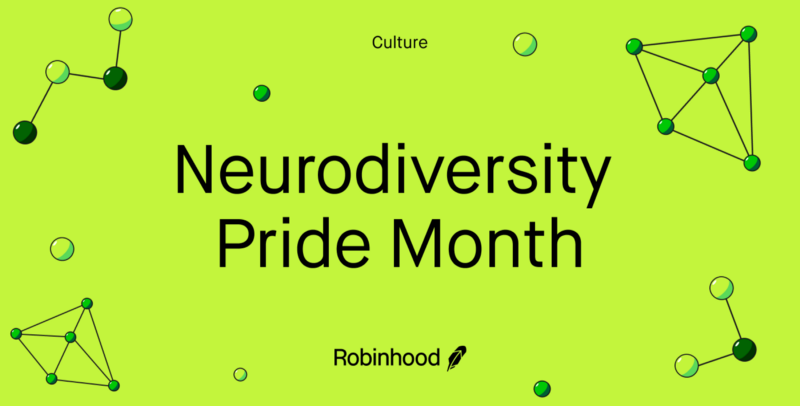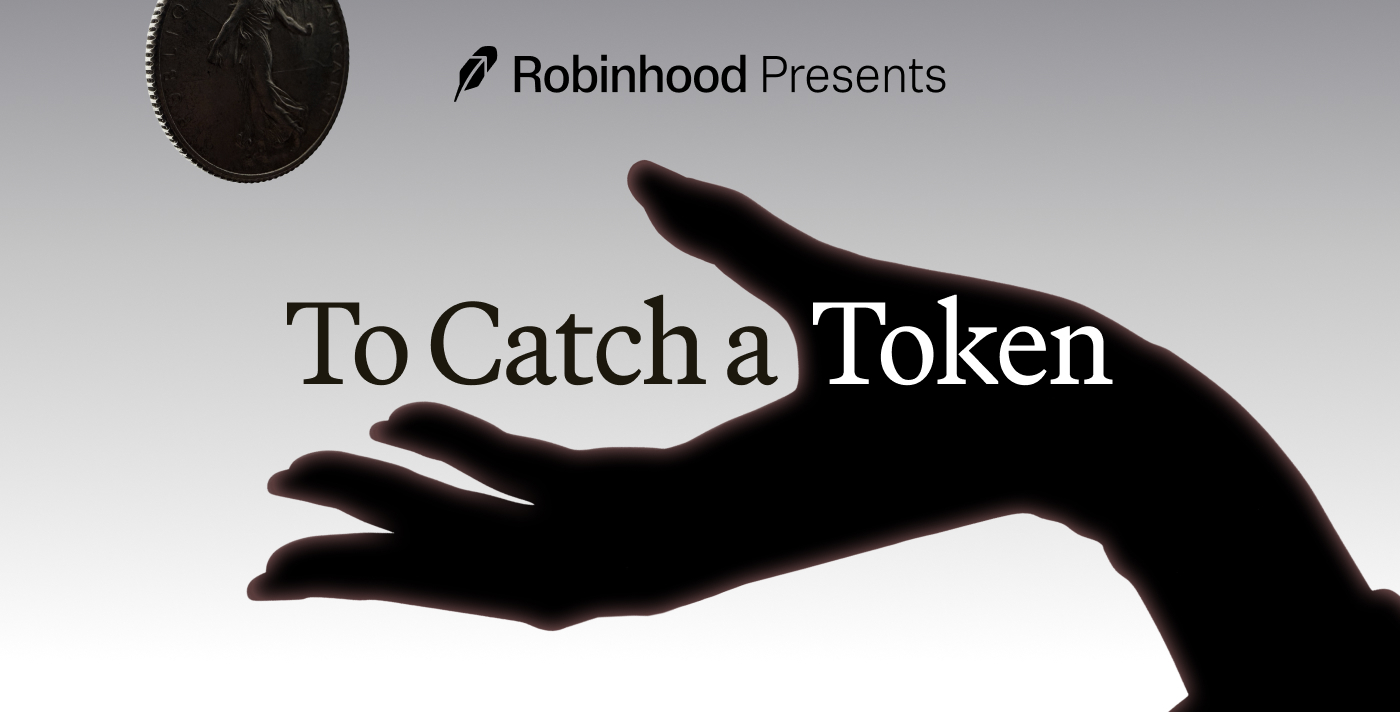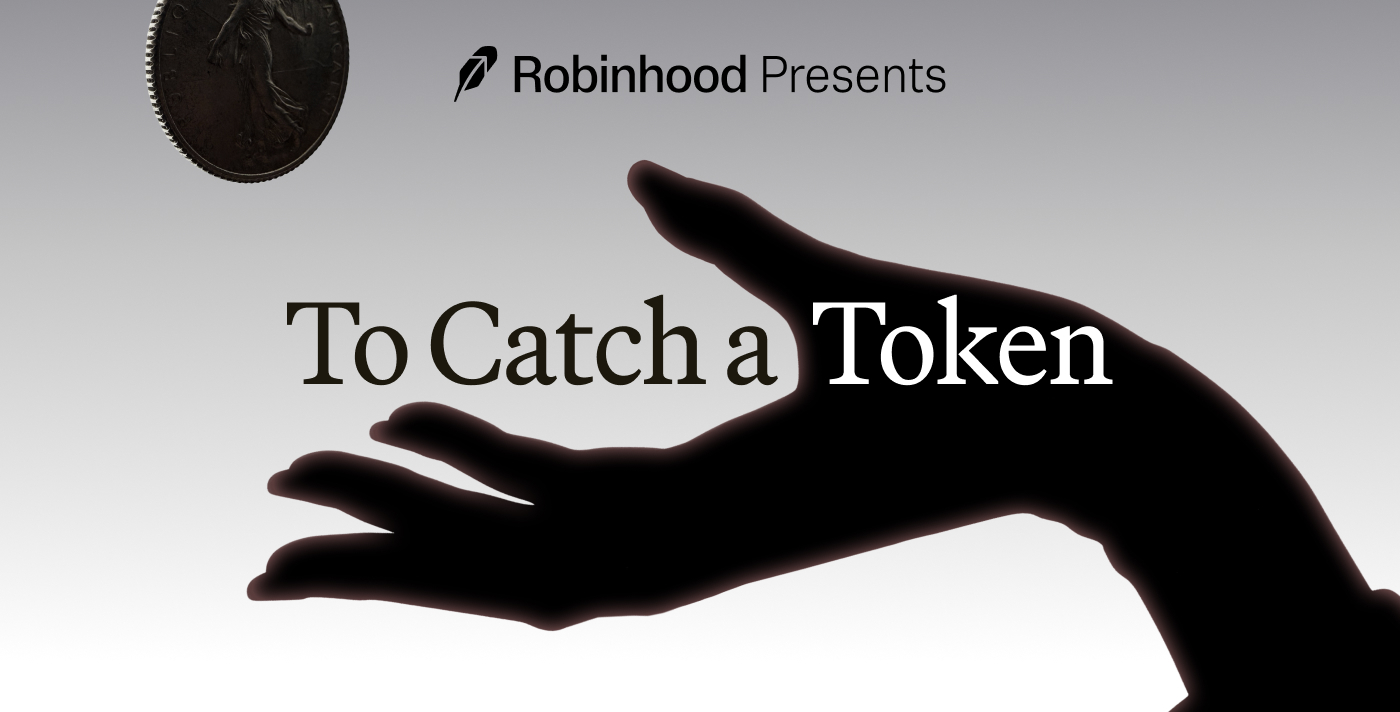Neurodiversity Pride Month — Hear from Divergent!

In honor of Autism Acceptance Month, our Divergent Employee Resource Group is hosting Neurodiversity Pride Month to celebrate the broad range of neurotypes, so we wanted to highlight the Robinhoodies of our Divergent ERG. Divergent celebrates the power of the neurodiverse community, while facilitating an equitable and supportive space to destigmatize and ensure members’ talents are embraced by Robinhood’s mission and vision. “As the founder of Divergent, I am extremely proud of what myself and all the leaders, members and allies have created. I have seen people who would have never shared that they are neurodiverse at their other jobs, taking leadership roles in Divergent because they are comfortable with being their authentic selves at Robinhood. We have stood up buddy programs and are working on a mentor program to help one another grow, and are plugged into the right places to support Robinhood’s efforts to drive meaningful change in inclusion, equity and belonging for all.” — Wesley Strickland (he/him), Senior Manager of Fiduciary Product Compliance and Founder of Divergent
Let’s hear from our Hoodies!
What does it mean to be neurodivergent?
To be unapologetically unique in my thinking/learning process.
– Monique Vopat (she/her), CXR — Advanced Safety & Privacy
To think, see, and interact with the world in ways others can’t begin to imagine. To bring creativity and innovation to a black and white world.
– Cali Kitchell (they/them), Advanced Brokerage Representative
Being neurodivergent means being advantaged and disadvantaged at the same time. It’s being able to be the person in the room who can pave a path through chaos, while also feeling the weight of everything. Your brain processes so much more, it can be paralyzing but it can also be a superpower.
– Natalie Baldini (she/her), Senior Program Manager, Marketing
Being neurodivergent means that you could have a different thought process than the person sitting next to you. It can also mean that you might struggle with everyday things that come easier to others. It can also be a mental illness, but that doesn’t mean that you are crazy! It means that your brain just functions differently.
– Missy Lester (she/her), Senior Manager — Customer Experience
How has being neurodivergent impacted you?
Masking who I am can be exhausting and I have a lot more anxiety than a lot of people. However, I feel like I can feel emotions on a deeper level than others (which is both good and bad).
– Cody Dawkins (she/her), Customer Experience Lead
Being Neurodivergent is as much part of my identity as being gay, married, a person who advocates for others and feels a deep sense of respect for other people, and a New Yorker. Being neurodivergent has been a huge value add through the years because of how I think, it has been a huge benefit to both me and the firm’s with which I have had the pleasure to work. That said, organizational systems and work in general has traditionally been designed for neurotypical people, and for a long time people who are autistic or think differently were seen as “handicapped” or less than their neurotypical peers, as evidenced by the greater degree of under and unemployment for qualified neurodiverse candidates. However many of us don’t see ourselves as handicapped at all and some of us are even considered gifted. Life has always been a little harder for neurodiverse people, because many things that neurotypical people take for granted, like getting to the office, the underlying processes at companies, or even the ways we communicate and information needed to do our job, vary a great deal between people who are neurodiverse. As a hiring manager myself, it is critical that we are cognizant of our bias when it comes to hiring neurodivergent candidates as much as we would be for any other group that isn’t the dominant one, especially if we value a culture with true diversity and inclusion.
– Wesley Strickland (he/him), Senior Manager of Fiduciary Product Compliance
Work relationships can suffer due to misinterpretation of behaviors and stamina is quickly drained from masking who I am in days filled with meetings. Productivity can suffer from processes and goals set up for neuro-normative humans.
– Amanda Parson (she/her), Director Programs and Operations, Security
My neurodivergence is largely sensory. Too much sound, text or flashing things and my body physically puts me to sleep which makes it a challenge in a world where we use a ton of Google docs and very few visuals. I learn and relate best in picture and even when I’m trying to dissect concepts, I usually start by breaking out visuals that help me understand connections. It tends to be a more resource based view of life: i.e. what do I have and how can that help build a better picture? I once described it as being able to stand in a forest of trees and not just see the trees and the depth of the forest but simultaneously to see all that and the bark, the sap, the moss and the detail that gives life to the ecosystem as if it is breathing all together, and without one of those details it would cease to be a forest. It’s a lot. Take that visual and now imagine a machine or person stomping through distracting you from focusing on that image with a diesel smell, loud jarring noises, physically moving the ground. Where do you focus? Do you stop paying attention to the environment or forest? Does that put you at risk of being run over by whatever it is coming at you? How do you know? My brain processes a lot of detail like that and when I am rested and in a supportive environment, it’s really hard for me to forget crazy amounts of detail about things once I’ve experienced them. All of that is really hard for people to relate to. What do you do with someone whose senses and awareness of what’s happening around them is almost always somewhere near 10? I worry a ton about how my intensity impacts others and it breaks my heart often when people mistranslate both my intensity and that of other neurodivergent folks.
– Tiffany Clark (she/her), Client Experience Manager
I have ADD — diagnosed in 4th grade. I had a hard time taking medications at that time so went unmedicated until 8th grade. When I was basically failing every class, I asked my parents for help and went on meds. I went from failing to getting As and Bs. As an adult I know what causes my ADD to be bad at times… stress. Medication helps, but knowing myself is the most important. I look at my ADD as a superpower because I can have my hands in many different things at one time and work well.
– Missy Lester (she/her), Senior Manager — Customer Experience
What do you wish more people knew about neurodiversity and what advice would you give to allies of the community?
Don’t treat the neurodiverse as “different”. The more you learn about it, the more everyone can see themselves in it. Neurodiverse is a label, but it is comprised of all kinds of personalities, exceptionalities and traits, so do not expect a one shop fits all program.
– Sue Terenzio (she/her), Compliance Senior Manager
Being neurodivergent is not an inherent weakness. It is a uniqueness. Neurodivergents may overcome initial challenges, and this often leads to enormous perspectives towards problem-solving and strategic-thinking. Avoid assuming that the person views this as a handicap. Each person and their needs are different, so listen to that person to understand what being neurodivergent means to them. Of course, be patient and genuine.
– David Straub (he/him), Advanced Brokerage CXR
Similar to differences in physical traits, we also have variations in our neurological design. Without all of the beautiful colors that a neurodivergent person contributes to society, we wouldn’t have people like Einstein, Mozart, Newton, and Seinfeld. Neurodivergence is a gift.
– Shannon Amin (she/her), Advanced Brokerage Lead
I wish people would understand how it really impacts our way of thinking and our way of working.
– Jason Mers (he/him), Software Engineer Intern
I’d like more people to know the strengths each neurodivergence brings to the workplace, community, relationships etc. There are really great Instagram and Tik Tok accounts that provide insight into neurodiverse communities so I recommend following a few for insights rather than rely on the neurodiverse community to explain everything to them. I follow several about ADHD and seeing posts or memes about it has helped me feel less..different..while also providing very relatable and sometimes hard content with a little comedic relief. These accounts also let me share with others what it’s like to have crippling symptoms at times since I have a hard time articulating something that’s hard for neurotypicals (and even myself) to understand or “see”.
– Laura Rushing (she/her), Margin Specialist
Neurodiversity does not mean a difference in intelligence, it’s just presented in a different box.
– Cody Dawkins (she/her), Customer Experience Lead
Educate, Educate, Educate. Educate yourself, ask questions, offer assistance.
– Monique Vopat (she/her), CXR — Advanced Safety & Privacy
We’re not a stereotype. Neurodiversity isn’t just one or two different diagnoses — it’s expansive and nuanced, and brings change in every aspect of the world. My advice for allies — listen. Research will only take you so far, but every neurodiverse person has their own experience that won’t necessarily match what you have read about.
– Cali Kitchell (they/them), Advanced Brokerage Representative
Read more from Wesley, Founder of Divergent, on celebrating neurodiversity
Read more about Divergent and all of Robinhood’s Employee Resource Groups
We are always looking for more individuals who share our commitment to building a diverse team and creating an inclusive environment as we continue in our journey in democratizing finance for all. Check out our open positions — we can’t wait to hear from you!
Robinhood and Medium are separate and unique companies and are not responsible for one another’s views or services.
© 2022 Robinhood Markets, Inc.


